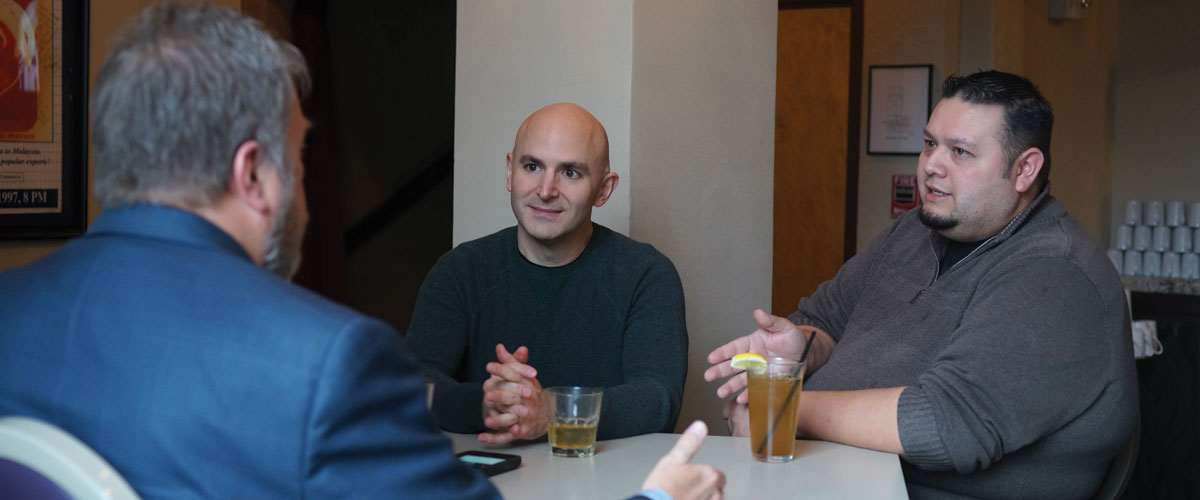Written by Julieta Gozalo
Last month, Kevin Sampson from DC Black Film Festival hosted The Social Media Conundrum: Is it Working & Alternatives as part of Film Festival Alliance’s FilmEx, a week-long virtual conference composed of talks, panels, and presentations focusing on “innovation, technological analysis, and methods to promote equity and inclusion in the film festival industry and independent film exhibition space”. The panel included Maggie Mackay from Vidiots Foundation, Daniel Kaplan from Fever Content, and Samuel Thomas from Deep in the Heart Film Festival. Creating original content can be difficult, especially in a time where people are consuming social media at an all time high. According to a GlobalWebIndex survey, July 2020 saw a rise of 10.5% in social media usage compared to July 2019.

Kevin Sampson from DC Black Film Festival.
As we inch closer to having spent an entire year dealing with the coronavirus pandemic, this event could not have come at a better time. Many festivals have delayed or had to scramble to adapt their festivals to a virtual platform. Social media platforms provide a great avenue for event marketing, and there is a great reliance on these sites. But, there is a pressure to find new and innovative ways to interact with audiences and keep them engaged.
Here are some ways the panel suggested engaging your audience with social media content:
Dealing with Social Media Burnout
We have all experienced social media burnout at some point during the pandemic year. And though 2021 promises access to vaccines and the possibility of opening business again over the next few months, it’s inevitable that we will continue to feel that burnout.
Kaplan suggests putting together a toolkit for filmmakers can be incredibly beneficial. This encourages filmmakers to speak on your behalf and get the word out about your organization while also allowing yourself to take a break from social media.
Both Thomas and Mackay point out that the advantages of working from home is that you can take a moment to step back and take a breather. “I go out in my community, I take [in] fresh air and get it all out,” Thomas says. “Then I feel more refreshed, and when I come back, if I have something relevant to say, I say it.”
Mackay adds that the people around you feel the same way. “These are extraordinary times. I try my hardest to count on the fact that good things will happen, and it’s okay to take a breather. Every one of my colleagues this week has said, ‘I’m having such a hard time sitting down to write, answering emails, phone calls, doing anything productive.’”
Remember that you are not alone in that struggle, and take the time to prioritize yourself and your wellbeing.
The Power of Nostalgia

Maggie Mackay of Vidiots.
Mackay found that telling the stories of the Vidiots community and appealing to their nostalgia is what raises engagement for her organization. For example, when community members reach out and share personal anecdotes connected to Vidiots, she’ll put a story together to share on their instagram, which helps the community get excited about their mission and story.
Kaplan recommends taking pictures in the physical venues used before the pandemic, as it helps with the nostalgic aspect and is another avenue for engagement. He also pointed out how DOC NYC had free virtual events every day of the festival, and a virtual road trip where DOC NYC went on Facebook Live to check in with filmmaking hubs around the country. They had interviews with filmmakers, programmers, and filmmaking advocates while also previewing DOC NYC’s 2020 slate.
Mackay also brought back their trivia night per the request of their Vidiots community. While she was hesitant at first, the trivia night ended up being a huge success, with people tuning in from China, Australia, and Korea. Guest hosts also helped liven up the festival, as well as using their own virtual backgrounds.
Quality vs. Quantity
In terms of establishing presence on many social media sites, quality is usually preferred over quantity. Thomas stresses that it’s important to stick to what you’re comfortable with. He usually has his personal presence on platforms like Reddit and TikTok, but only interacts on those platforms if it is in an organic way, or if he feels it connects to what his organization is trying to do.
Kaplan adds that it can be beneficial to use younger people on your team to experiment with newer platforms that they are familiar with. “Find the person on your team who is the most passionate about social media […]If there’s a younger person on your team who is a TikTok nerd and really wants to get you on that platform, give them the reins and let them go for it. If you’re trying to come in not knowing what you’re doing, it’s not going to work and be a waste of time.”
Many organizations also use newsletters or email blasts in addition their social media presence to send out the word about their festivals. Mackay tries to only send email blasts when they have an active capital campaign or upcoming virtual events, so that they don’t overwhelm their community. Thomas sends out blasts to their film festival alumni, their community, and on an event basis. Thomas emphasizes he doesn’t want to “harangue people with information just because we’re supposed to. We’re not just filling up people’s inboxes.” Narrowing in on special events also helps creators avoid burnout by not overwhelming themselves with too much content to send out.

Utilizing Analytics and Paid Posts
Sampson made a point to bring up how to use analytics and paid promotion to a festival’s advantage, features that are the most highly regarded when it comes to keeping track of and boosting engagement. Kaplan notes that most platforms have a good analytics program, and recommends starting out by sending an email to your entire list during a festival, and using the analytics to see if your strategies are working or not. He also advises to use analytics to see how posts are discovered, or if a hashtag strategy is working.
Thomas recommends to use paid posts strategically: during moments when festivals are trying to grow their audience or hype up a certain thing that the community will connect with. While Mackay doesn’t use paid posts, she asserts that the best way to expand reach is to cross promote colleagues’ and peers’ work that have a mission overlap, as well as authentically engaging with people doing similar work as you.
Keeping Your Audiences Engaged
Festivals have also encountered the hurdle of capturing their virtual festivals and events in an exciting and vibrant way, due to the majority of events being hosted through Zoom. Deep in the Heart Film Festival gave out swag bags to filmmakers who included their mailing address with their information. In turn, the filmmakers posted about it on their social media platforms .

Addressing Social and Political Topics
Throughout 2020, we have become painfully aware of the fine line organizations tread to navigate the social media world responsibly. Some think that it’s good to acknowledge and engage with what’s happening around us, while others think that if organizations do not have authority on a topic it’s better to step out of the way. All the panelists agreed that it’s important to recognize what is going on, but to do it in a genuine way.
Thomas says, “When you don’t have the authority on something, you shouldn’t be speaking on it. That being said, if it is organic and represents who you are as a festival or represents your community, then you should. It’s about connecting and finding common ground, as long as it’s sincere.”
Which brings us to the final piece of advice…
Be Sincere
Kaplan recommends to start with authenticity. Find what you’re the most passionate about, and people will respond. “Tell your story. Why are you doing what you’re doing? Tell the story of the members of your film community. Tell the story of how you’re pulling an event together. Anything that is pulling back the curtain can be a great place to start developing content.” Sincerity doesn’t just end with the community, but it also translates over to the previous point of political and social topics. If it comes from a place of sincerity, don’t be afraid to take a stand and voice your support.
Thomas and Kaplan rounded out the panel by leaving the audience with these pieces of advice: “Be sincere, if it doesn’t fit your festival or brand don’t do it. Be yourself, and good things will happen.” Kaplan adds, “The more that you give, the more you will receive, just like real life social interactions. Be a giving person.”

